

~~~~~~~~~~~~~~~~~~~~~~~~~~~~
SCUBA News (ISSN 1476-8011)
Issue 264 - July 2022
https://www.scubatravel.co.uk
~~~~~~~~~~~~~~~~~~~~~~~~~~~~~
Contents:
What's new at SCUBA Travel?
Aqaba Leaders Dive Center, Jordan
I went for a dive in the Gulf of Maine and saw just ONE Fish
35% Off Diving the Philippines
Diving news from around the World
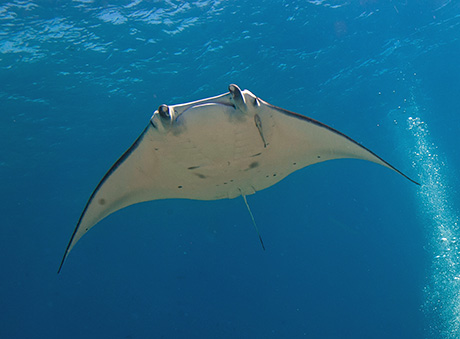 |
Komodo - one of the best diving destination in the world For sharks, manta rays, eagle rays and loads of life with wild currents head for the north-east of Komodo.
|
 |
Guide to diving the Canary Islands The rugged Canary Islands are one of the most popular dive destinations in Spain, offering diving at UNESCO Biosphere Reserves and marine reserves teeming with life. |
Aqaba Leaders Dive Center, Jordan
Showing the wonders of underwater life in the Red Sea. Find out more...
Critically endangered, the hawksbill turtle lives throughout the world's tropical seas. In the last 100 years their numbers have declined by 80%. However, where countries protect them, and enforce the protection, populations recover.
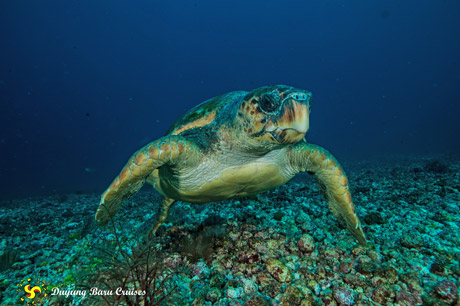
When they leave their beach nest, most hawksbill hatchlings swim to the open sea. They stay here for up to 5 years, after which they migrate to their coral reef homes. Here you see themn resting on ledges before swimming to the surface to breath.

Hawksbill turtles don't reach sexual maturity until between 14 and 35 years old. Females then return to the beach where they were born to lay their eggs.
The temperature of the nest determines whether the baby turtles will be male or female. Higher temperatures mean more females. Turtles have evolved to nest when temperatures favour equal numbers of male and female hatchlings, but if this is already the coldest time on their beach, then birth ratios will shift to females is temperatures rise further.
A female turtle lays eggs only every 2 to 5 years. In her breeding year though, she lays several clutches. Males may visit several rookeries, so a male-female imbalance might not be critical for the turtles.
Hawksbill turtles are endangered because of our actions like harvesting tortoiseshell, loss of habitat, light pollution and by-catch. As they grow slowly and take years to mature, populations have difficulty recovering.
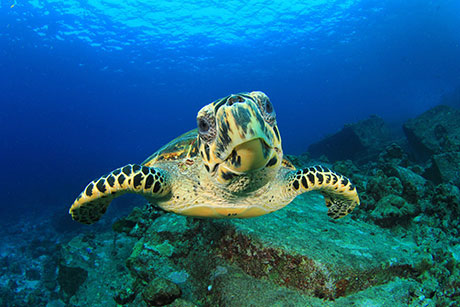
They are called Hawksbill Turtles because of their pointed beak which they use to scrape sponges from the reef to eat.
The largest populations live in northwest Australia, the Solomon Islands and Indonesia. In the Atlantic, Mexico, Cuba and Barbados are Hawksbill turtle hotspots.
Save 25% on any trip to Malapascua and Leyte or Visayas and Bohol in the Philippines
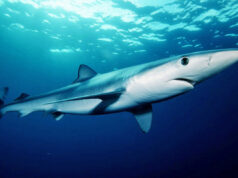 |
Mexico bans white shark diving at Guadalupe until December
|
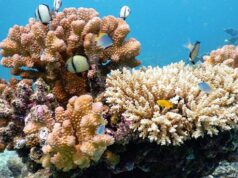 |
Reef-World Foundation launches Green Fins in Japan
|
 |
Why do seals have whiskers?
|
 |
Sea urchinsí secret to surviving marine heatwaves
|
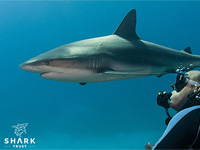 |
Divers: Join the Great Shark Snapshot
|
SCUBA News is licensed under a Creative Commons Attribution 4.0 Unported License. This means we are happy for you to reuse our material for both commercial and non-commercial use as long as you: credit the name of the author, link back to the SCUBA Travel website and say if you have made any changes. Some of the photos though, might be copyright the photographer. If in doubt please get in touch.
Photo credits: Tim Nicholson, Jill Studholme, Kristin Riser, Jianye Sui
Previous editions of SCUBA News are archived at https://www.scubatravel.co.uk/news.html
SUBSCRIBING AND UNSUBSCRIBING
Visit [UNSUBSCRIBE] and add or remove your e-mail
address. To change whether your receive the newsletter
in text or HTML (with pictures) format visit [PREFERENCES]
ADVERTISING
Should you wish to advertise in SCUBA News, please
see the special offers at
https://www.scubatravel.co.uk/newsad.html
Other advertising opportunities are at
https://www.scubatravel.co.uk/advertising.html
CONTACTING THE EDITOR
Please send your letters or press releases to:
Jill Studholme
SCUBA News
The Cliff
DE6 2HR
UK
news@scubatravel.co.uk
PUBLISHER
SCUBA Travel, 5 Loxford Court, Hulme, Manchester, M15 6AF, UK
Our newsletter, SCUBA News (ISSN 1476-8011), is absolutely free. It is a monthly publication, delivered by e-mail. To receive your copy fill in your details below. We will never pass your e-mail address to any third parties, or send you unsolicited e-mail.
To receive your copy fill in your details below. We will never pass your e-mail address to any third parties, or send you unsolicited e-mail.
You will receive an e-mail confirming your subscription. If you don't receive this you may have entered your e-mail address incorrectly - revisit this page and re-subscribe.
We love hearing from you: send us any news, dive write ups, reviews or comments